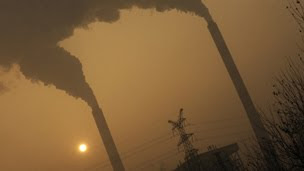A giant sheet of ice measuring 260 sq km (100 sq miles) has broken off a glacier in Greenland, according to researchers at a US university.
The block of ice separated from the Petermann Glacier, on the north-west coast of Greenland.
It is the largest Arctic iceberg to calve since 1962, said Prof Andreas Muenchow of the University of Delaware.
The ice could become frozen in place over winter or escape into the waters between Greenland and Canada.
If the iceberg moves south, it could interfere with shipping, Prof Muenchow said.
Cracks in the Petermann Glacier had been observed last year and it was expected that an iceberg would calve from it soon.
The glacier is 1,000 km (620 miles) south of the North Pole.
A researcher at the Canadian Ice Service detected the calving from Nasa satellite images taken early on Thursday, the professor said.
The images showed that Petermann Glacier lost about one-quarter of its 70km-long (43-mile) floating ice shelf.
There was enough fresh water locked up in the ice island to "keep all US public tap water flowing for 120 days," said Prof Muenchow.
He said it was not clear if the event was due to global warming.
The first six months of 2010 have been the hottest on record globally, scientists have said.
Meanwhile, climate change talks 'backslide' at Bonn
Global climate change talks have moved backwards since last year, say negotiators from both rich and poor nations at discussions in Germany.
The US envoy said some countries had "walked away" from commitments made at Copenhagen last year to contain greenhouse gas emissions.
But the top UN climate official, Christiana Figueres, said progress had been made towards an eventual deal.
Negotiators are working towards the next climate summit in November.
There is one last preparatory meeting, in Tianjin, China, in October, to draft a negotiating text before the summit in Cancun, Mexico.
"At this point, I am very concerned," said chief US negotiator Jonathan Pershing at the conclusion of a week of talks in Bonn.
"Unfortunately, what we have seen over and over this week is that some countries are walking back from progress made in Copenhagen, and what was agreed there."
Mr Pershing said some of the major developing countries were backing away from commitments to slow the growth of their greenhouse gas emissions, saying such controls should only apply to industrialised countries.
He warned that record global temperatures, devastating floods in Pakistan and forest fires in Russia were "consistent with the kind of changes we could expect from climate change, and they will get worse if we don't act quickly".
The accord reached at the fractious summit in Copenhagen last year recognised the need to limit global temperatures rising no more than 2C (3.6F) above pre-industrial levels.
In the non-binding agreement, rich countries promised to deliver $100bn a year by 2020 to help poor countries cope with the impacts of climate change.
'Progress'
The EU's climate commissioner Connie Hedegaard was also pessimistic about the Bonn talks.
"These negotiations have if anything gone backwards," she said.
"This imbalance is not helpful and could seriously endanger the prospects of securing the successful outcome the world needs from the Cancun climate conference next December."
The climate text under discussion has doubled to 34 pages as countries have added new proposals or reinserted old ones.
UN climate chief Christiana Figueres said countries must "radically narrow down their choices" at the Tianjin meeting.
But, she said, "if you see the bigger picture, we have progress here in Bonn".
A grouping of small island nations - those most affected by rising sea levels - said rich nations' pledges to cut emissions was not enough.
The leader of the 43-nation Association of Small Island States, Dessima Williams of Grenada, said the lack of legislation in the US to curb emissions was a setback.
"That has been taken as a signal by some that nothing can occur," she said.
A US energy bill is more focused on reforming offshore oil drilling, after the Gulf of Mexico oil spill, but Washington has said it will stick by its targets for reducing emissions.


No comments:
Post a Comment